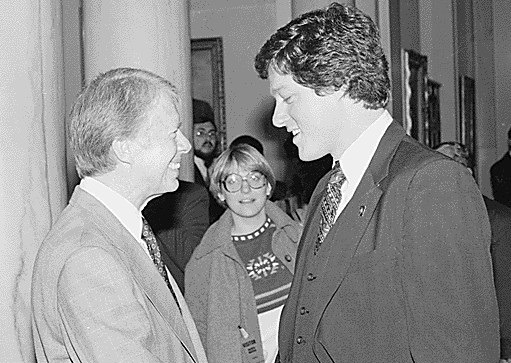Jimmy had already demonstrated a knack for business at the age of five when he began selling peanuts on the streets of Plains. Carter put his money into five bales of cotton when he was nine years old, which he saved for several years before selling for a profit. He was able to buy five ancient properties in Plains with this money.
He attended Plains public schools, Georgia Southwestern College, and the Georgia Institute of Technology, and graduated with a B.S. degree from the United States Naval Academy in 1946. He joined the Navy as a submarine crew and rose to the rank of lieutenant while working in both the Atlantic and Pacific fleets. Then, Admiral Hyman Rickover chose him for the nuclear submarine program. He was dispatched to Schenectady, New York, where he studied reactor technology and nuclear physics at Union College and served as the senior officer of the Seawolf’s pre-commissioning crew.
He qualified to command a diesel-electric submarine after being promoted to a junior officer in the Navy. Then, he applied for the U.S. Navy’s fledgling nuclear submarine program, directed by Captain Hyman G. Rickover, who significantly affected him.
Jimmy married Rosalynn Smith on July 7, 1946. They have four children together.
Later, he studied nuclear physics and was appointed as a mechanical engineering officer on one of the first atomic submarines. After his father died, he was forced to take over the family company and was dismissed from the Navy on October 9, 1953. Following that, he went to Georgia to assist his family with their company, eventually expanding the peanut industry, which helped him stabilize his finances and make him rich.
Jimmy Carter began his political career as a member of several municipal bodies, boards, schools, and hospitals, among other things.
He served in the Georgia state Senate from 1961 to 1966, representing Georgia’s fourteenth district. Jimmy opted not to run for re-election to the state Senate in 1966 because he planned to run for governor.
He ran for Georgia as a governor in 1966 and lost, but he ran again in 1970 and won. On January 12, 1971, he was elected Governor of Georgia, a position he maintained until January 14, 1975.
He ran against Gerald Ford, the President at the time, in the 1976 presidential elections. On November 2, 1976, Carter narrowly won the presidential election.
From January 20, 1977, until January 20, 1981, he was President of the United States. The Panama Canal Treaties, the Treaty of Peace between Egypt and Israel, the SALT II Treaty with the Soviet Union, and diplomatic relations with China were all made during his administration.
After losing to Ronald Reagan, he resigned from the government and moved to Plains, Georgia. He was active in diplomatic efforts to create a peace accord with North Korea and be a key player in Habitat for Humanity.
He started The Carter Center and became University Distinguished Professor at Emory University in Atlanta, Georgia, in 1982. The nonpartisan and nonprofit Center, which President Carter actively supervises, tackles national and worldwide public policy concerns. Staff and colleagues at the Carter Center work alongside President Carter to settle conflicts, promote democracy, preserve human rights, and prevent sickness and other illnesses. The Center has led the international campaign to eliminate Guinea worm disease, which is on track to become the second human illness to be wiped out in history.
His significant works and achievements are the following: His 2006 book, ‘Palestine: Peace Not Apartheid,’ is a narrative of the discussions between Israeli Prime Minister Menachem Begin and Egyptian President Anwar Sadat that led to the Israel-Egypt Peace Treaty. Jimmy’s book was a big seller in the New York Times.
His memoir on his post-presidency time, ‘Beyond the White House: Waging Peace, Fighting Disease, Building Hope,’ was published in 2007, and it quickly became one of the most popular books of the year, selling thousands of copies in its first week.
In 2002, he was honored with the Nobel Peace Prize.
He has received several honors, including an LL.D. from New York Law School and a degree from the University of Pennsylvania.
In 2007, Jimmy Carter was named an Honorary Fellow of the Royal College of Surgeons in Ireland and an Honorary Fellow of Mansfield College in Oxford.
There are some interesting trivia about Jimmy Carter: Jimmy Carter was the first-ever President of the United States to be born in a hospital. Throughout his life, this American President was a Christian Sunday school teacher.
While traveling Central and South American nations, this notable American politician was fluent in Spanish and composed his speeches.
Following the Soviet Union’s invasion of Afghanistan, this American President led the boycott of the 1980 Moscow Olympics.
US Presidents | ||

